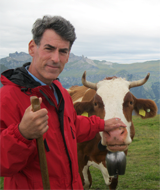





Free range scholar Paul LucierProfessional MembershipsSociety for the History of Technology |
WelcomePaul Lucier is a historian of the earth sciences, mining technology, and the environment. He is interested in the evolution of ideas about the earth and how scientific theories and practices were involved in and influenced by the exploration and extraction of mineral resources. Lucier has recently completed a book on nineteenth-century American geology, mineralogy, and chemistry and the role those sciences played in the rise of the coal, kerosene, and petroleum industries. Scientists and Swindlers: Consulting on Coal and Oil in America, 1820-1890 (Johns Hopkins University Press, 2008) is a sweeping study of entrepreneurial science, or, as it was called, scientific consulting - a professional practice that marked the initial step in the commercialization of American science. Commercialization forms a central theme in Lucier's research on the relations among science, technology, and industry. Commercialization refers to a variety of historical arrangements between payment and the pursuit of knowledge. These can often be distilled into one key, analytical question:
Several variations on the theme of commercialization are pursued in related research topics:
Lucier is currently at work on a book on the American West and the development of hard rock mining - gold, silver, and copper - in the late 19th and early 20th centuries. In that setting, the new inter-disciplinary fields of economic geology, geophysics, and geochemistry emerged along with the United States Geological Survey (est. 1879). Science and the survey were inextricably linked to the spread of very large, very deep mines and very large, very highly-capitalized companies. In this interpretation, the mining of the American West was as much a scientific pursuit as it was an industrial enterprise. Lucier has won numerous awards for his scholarship and teaching. In his research, he has explored a colorful range of scientific-industrial landscapes - from the rusted wells along Oil Creek, Pennsylvania to the ghostly head frames of Butte, Montana, from the barren tailing heaps of Leadville, Colorado, to the fossil cliffs of the Joggins, Nova Scotia, Canada. In his teaching, he is also traveled far - across two continents and four universities. It is this kind of intellectual journey that characterizes a free range scholar. 
|
|
Copyright © 2011 Paul Lucier Website design by www.jrsart.net. |
|